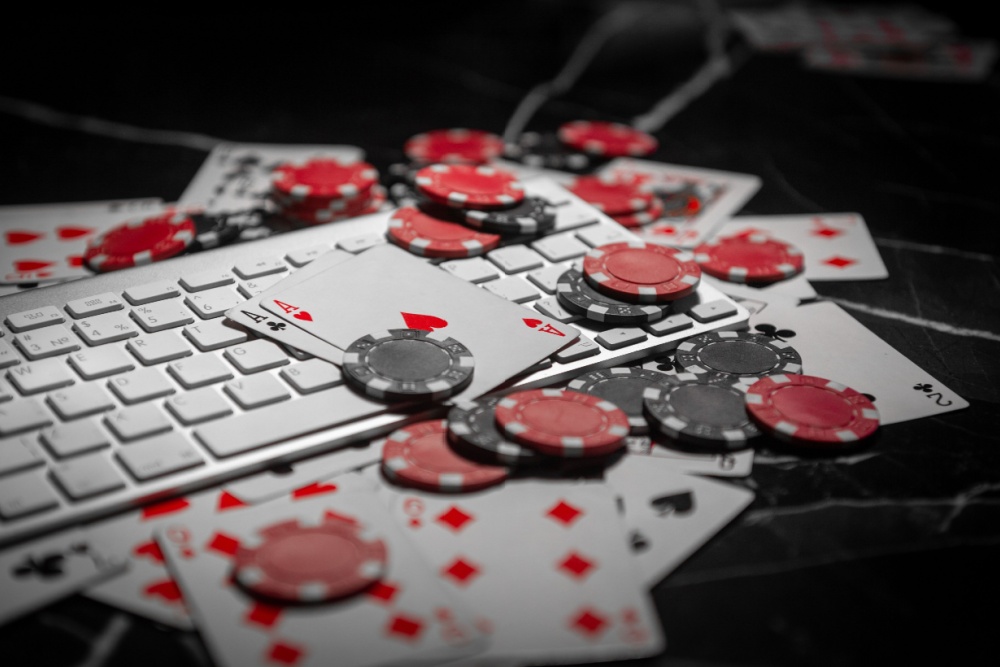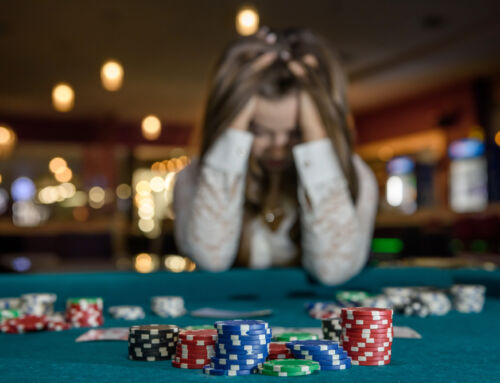Gambling is often portrayed as a fun and exciting activity, a chance to test one’s luck and potentially win big. Yet, for some people, what begins as harmless entertainment can spiral into compulsive behavior, leading to significant distress and impairment in various aspects of life. In this article, we will dive into the intricate web of factors contributing to gambling problems, exploring internal and external influences and the psychological mechanisms involved.
Understanding Behavioral Addiction
Before getting into the specifics of gambling addiction, it’s essential to understand the concept of behavioral addiction. While substance addiction involves dependence on drugs or alcohol, behavioral addiction centers around excessive engagement in a behavior despite negative outcomes, or in other words harm. Gambling disorder falls under this conceptualization, characterized by an uncontrollable urge to gamble, leading to negative outcomes.
Factors Contributing to Gambling Addiction
Internal vs. External Influences
Gambling activates the brain’s reward system, which includes the mesolimbic pathway—commonly known as the brain’s reward center. This pathway releases dopamine, a neurotransmitter associated with pleasure, in response to rewarding stimuli like gambling wins. The resulting dopamine surge reinforces gambling behavior, making individuals more likely to continue and seek out these experiences. Over time, as gambling repeatedly stimulates this reward system, the brain can become dependent on these dopamine highs and lead to urges.
Internally, cognitive distortions reinforce gambling behavior. Irrational beliefs, such as an illusion of control or perceived luck, cause individuals to underestimate risks and overestimate their odds of winning. This combination of a dopamine-fueled reward system and cognitive biases makes gambling addiction especially challenging to overcome.
Externally, environmental factors amplify these internal influences. The widespread availability of gambling venues—whether in-person or online—along with cultural acceptance and exposure to gambling ads, normalizes gambling and increases accessibility. Vulnerable populations are particularly affected by these external cues, which can prompt or sustain gambling behaviors.
Understanding both the neurobiological mechanisms and external factors at play is necessary for addressing gambling addiction. By recognizing how these internal and external influences intersect, we can develop more effective prevention and intervention strategies to help individuals break free from the cycle of gambling addiction.
Psychological Factors
Psychological factors also contribute significantly to gambling problems. Co-occurring psychological struggles such as depression and anxiety are common among individuals with gambling problems. Gambling may serve as a maladaptive coping mechanism to alleviate negative emotions or escape from stressors, further reinforcing the addictive cycle.
Personality traits, while not deterministic, can also influence susceptibility to gambling problems. Certain traits, such as impulsivity and sensation-seeking, may predispose individuals to engage in risky behaviors, including excessive gambling. However, it’s essential to recognize that personality is just one piece of the puzzle, with environmental and situational factors also playing a part.
Does Gambling Always Lead to Addiction?
There are many factors that contribute to gambling issues, including the internal, external, and psychological influences mentioned above. But gambling doesn’t inherently lead to addiction for everyone. Many people engage in gambling as a recreational activity, enjoying it occasionally as a social pastime or a form of entertainment.
While gambling doesn’t automatically result in addiction, some may need to exercise more caution based on their specific circumstances.
Is Gambling Addiction a Disorder?
Gambling addiction is recognized as a disorder. According to the DSM-5, it’s classified as a behavioral addiction under the category of “Substance-Related and Addictive Disorders.” This classification shows just how serious and impactful gambling addiction can be on a person’s life.
Gambling disorder was first recognized as a disorder in 1980. Initially, it was grouped under “Impulse-Control Disorders Not Elsewhere Classified.” During that time, people often referred to it as “compulsive gambling,” focusing on the individual’s drive or compulsion to gamble. It was thought to be similar to conditions like OCD or pyromania, where the person feels a distressing need to engage in the behavior.
As research on gambling problems advanced, it became clear that the term “compulsion” didn’t quite capture what was going on. Unlike the anxiety-driven behaviors seen in OCD, gambling problems were more about anticipation and the thrill of taking risks. Over time, studies showed that gambling problems were more similar to substance use disorders than to compulsive behavior problems.
Episodic vs. Persistent Gambling Problems
Gambling problems can vary in intensity and duration, ranging from episodic to persistent. Episodic gambling may involve occasional bouts of excessive gambling, often triggered by situational factors such as financial stress or emotional distress. In contrast, persistent gambling entails a chronic and compulsive pattern of gambling behavior, regardless of external circumstances or consequences. Understanding the differences between these patterns informs interventions and treatment approaches designed to meet each person’s individual needs.
Dealing with a Gambling Problem
Recognizing and addressing gambling problems requires a multifaceted approach that addresses both the behavior itself and underlying contributing factors. It’s helpful for individuals struggling with gambling problems to seek support and professional help.
For those grappling with the urge to gamble, immediate strategies can make a significant difference. Working with someone on coping strategies can help. Therapy, such as Cognitive-behavioral therapy (CBT), can help people identify and challenge maladaptive thoughts and behaviors associated with gambling. This type of therapy provides tools to manage urges effectively and redirect focus towards healthier activities.
Support groups like Gamblers Anonymous offer a supportive community and guidance for those seeking to overcome their struggles. Sharing experiences and coping strategies within these groups can provide additional support. Establishing barriers to gambling, such as self-exclusion programs and blocking access to gambling websites, can also be helpful in reducing the temptation to gamble. Developing coping skills and addressing underlying issues such as co-occurring mental health conditions are crucial steps in the recovery process.
In conclusion, a gambling problem is complex and is influenced by a combination of internal and external factors, psychological mechanisms, and environmental influences. While dopamine release and cognitive distortions play a role in reinforcing gambling behavior, it’s essential to recognize the broader context in which addiction develops. By understanding the underlying factors contributing to gambling problems and adopting a holistic approach to treatment and support, individuals can embark on a path to recovery and reclaim control over their lives. Recovery is possible; seeking help is the first step toward healing and transformation.
Gain Support from The Gambling Clinic® in Tennessee
If you or someone you know is struggling with a gambling problem, don’t hesitate to reach out for support. The Gambling Clinic® in Johnson City, Tennessee, offers comprehensive treatment and assistance for people seeking to overcome their gambling problems. With experienced professionals and a supportive environment, The Gambling Clinic® is committed to helping you on your journey to recovery. Contact us today to learn more and take the first step towards a healthier, happier life.
Frequently Asked Questions
What are the warning signs of gambling addiction?
Warning signs of gambling addiction include a preoccupation with gambling, lying about gambling habits, chasing losses, borrowing money to gamble, and experiencing distress or impairment due to gambling. If you or someone you know is exhibiting these signs, it may be indicative of a gambling problem.
Can gambling problems be treated?
Yes, gambling problems can be treated. With the right help, individuals can overcome their problems and regain control over their lives. Treatment options may include therapy, support groups, medication, and lifestyle changes. Seeking help from professionals is crucial for effective treatment.
How can I help a loved one with a gambling problem?
Supporting a loved one with a gambling problem can be challenging, but there are steps you can take to help. Encourage them to seek professional help and offer your support and understanding without enabling their addictive behavior. Educate yourself about gambling problems and be patient and compassionate throughout the recovery journey.
Is it possible to gamble responsibly?
While some individuals can gamble recreationally without developing a problem, others may be more susceptible to addiction. Responsible gambling involves setting limits, sticking to a budget, and recognizing when gambling is becoming problematic. If you find yourself struggling to control your gambling habits, seek help before it escalates into a problem.
How do I know if I need help with a gambling problem?
If you’re experiencing distress or impairment due to gambling, or if you’re unable to control your urge to gamble despite negative consequences, it may be time to seek help. Admitting that you have a problem is the first step towards recovery. Contact a therapist, support group, or specialized treatment center for assistance.
What should I expect during treatment for a gambling problem?
Treatment for a gambling problem typically involves therapy, support groups, and possibly medication to address underlying issues and manage symptoms. You can expect to work closely with a therapist to identify triggers, develop coping strategies, and learn healthier ways of managing stress and emotions. Support groups provide a sense of community and understanding among individuals with similar experiences.
How long does recovery from a gambling problem take?
Recovery from a gambling problem is a lifelong journey, and the duration varies for each individual. While some may see significant improvement relatively quickly, others may require ongoing support and maintenance to prevent relapse. It’s essential to stay committed to your recovery plan and seek help when needed, even after completing formal treatment. Remember, recovery is possible with dedication and perseverance.







